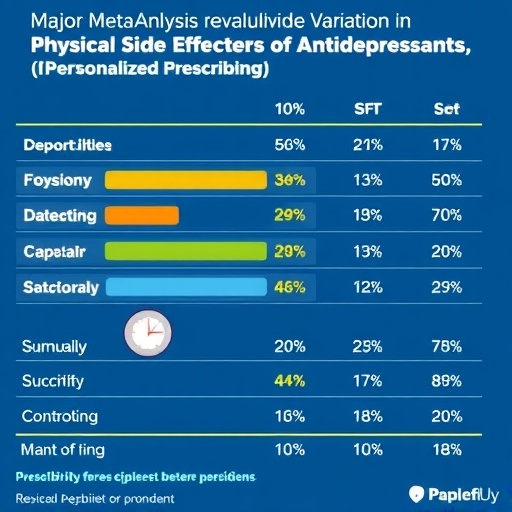A comprehensive new meta-analysis published in The Lancet reveals significant variabilities among antidepressants concerning their physiological impacts on the human body. By synthesizing data from 151 clinical trials and 17 FDA reports encompassing over 58,000 participants, this systematic review scrutinizes how 30 different antidepressant medications affect critical cardiometabolic parameters and other physical health indices over an average treatment duration of eight weeks. The findings challenge common assumptions that antidepressants exert uniformly negligible side effects on physical health and underscore the necessity for tailored therapeutic approaches in psychiatric care.
One of the most striking discoveries from this expansive analysis is the substantial differences in weight changes linked to specific antidepressants. The research identifies approximately a 4 kilogram disparity in average weight change between certain drugs. For instance, agomelatine—a melatonergic antidepressant—was associated with an average weight loss of about 2.5 kilograms, whereas maprotiline, a tetracyclic antidepressant, correlated with an average weight gain of around 2 kilograms. Such weight alterations not only influence patients’ physical health but can also affect treatment adherence and overall quality of life.
Moreover, the study’s findings reveal noteworthy discrepancies in cardiovascular effects among different antidepressant medications, particularly in heart rate modulation. Some drugs were linked to pronounced bradycardic effects, while others exhibited a tendency to elevate heart rate markedly. Fluvoxamine, for example, was observed to reduce heart rate by an average of eight beats per minute (BPM), whereas nortriptyline increased heart rate by approximately 14 BPM. These distinctions carry clinical significance, especially for patients with preexisting cardiovascular conditions, and demand careful consideration when selecting pharmacotherapy.
Blood pressure changes presented another dimension where antidepressants displayed divergent profiles. The analysis documented a blood pressure difference exceeding 10 millimeters of mercury (mmHg) among certain agents. Notably, nortriptyline was associated with a blood pressure reduction of roughly 7 mmHg, contrasting with doxepin, which tended to elevate blood pressure by around 5 mmHg. These cardiovascular influences may have implications for hypertensive patients or those at risk of cardiovascular events, highlighting the necessity for vigilant monitoring.
Quantitatively, the investigation estimated that drugs like maprotiline and amitriptyline could provoke weight gain in nearly 50% of individuals prescribed these medications. Conversely, medications such as agomelatine were linked to weight loss in about 55% of cases. This differential propensity towards weight modulation may relate to the pharmacodynamic profiles of these drugs, including their receptor binding affinities and metabolic pathways involving appetite regulation and energy balance.
Importantly, the meta-analysis found that most antidepressants did not present major adverse impacts on renal or hepatic function, electrolyte balance, or cardiac electrical activity—parameters crucial in assessing the overall safety of pharmacotherapy. This suggests that the cardiometabolic effects, especially those influencing heart rate and blood pressure, are more pronounced than any cytotoxic or organ-specific toxic effects within the eight-week treatment window analyzed.
Nevertheless, the authors caution that the persistence and long-term trajectory of these physical changes remain unclear, as existing data predominantly pertain to short-term treatment periods. Determining whether these physiological effects stabilize, worsen, or ameliorate with prolonged medication use represents an essential area for future research, particularly given the chronic nature of many depressive disorders.
In the broader context of clinical practice, these findings demand a paradigm shift toward personalized medicine. Treatment guidelines for depression and related affective disorders should integrate the heterogeneous cardiometabolic profiles of antidepressants. Shared decision-making between clinicians and patients, which incorporates individual health status, risk factors, and lifestyle preferences, becomes paramount to optimizing therapeutic outcomes and minimizing adverse effects.
Additionally, the study acknowledges that its scope did not encompass other critical dimensions such as sexual dysfunction, emotional side effects, or differential efficacy among antidepressants. These factors are equally vital in shaping comprehensive treatment plans and warrant integrated evaluation alongside physiological side effects to inform individualized care fully.
From a mechanistic perspective, the differential cardiometabolic effects may arise from varying neurotransmitter system targets, including serotonergic, noradrenergic, dopaminergic, and melatonergic pathways, as well as off-target receptor interactions. These pharmacological nuances influence autonomic regulation, metabolic processes, and vascular tone, which collectively modulate weight, heart rate, and blood pressure dynamics.
The study also provides an extensive conflict of interest disclosure, reflecting transparency and the involvement of researchers with diverse ties to pharmaceutical companies, ensuring a balanced interpretation of findings. This transparency bolsters the credibility of the meta-analysis and underscores the complexity of conducting large-scale pharmacological research within a landscape of overlapping academic and industry collaborations.
Overall, this landmark systematic review and network meta-analysis furnish crucial evidence that antidepressant medications are far from physiologically inert, exerting distinct and clinically meaningful effects on cardiometabolic health. As the global burden of depressive disorders escalates, integrating such nuanced knowledge into clinical guidelines will enhance treatment safety, patient satisfaction, and holistic outcomes in psychiatric care.
Subject of Research: People
Article Title: The effects of antidepressants on cardiometabolic and other physiological parameters: a systematic review and network meta-analysis
News Publication Date: 21-Oct-2025
Web References: DOI: 10.1016/S0140-6736(25)01293-0
Keywords: Health and medicine, Antidepressants




